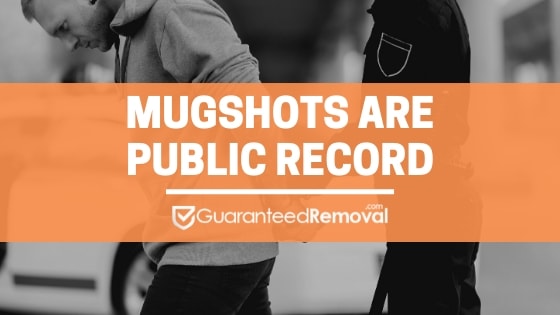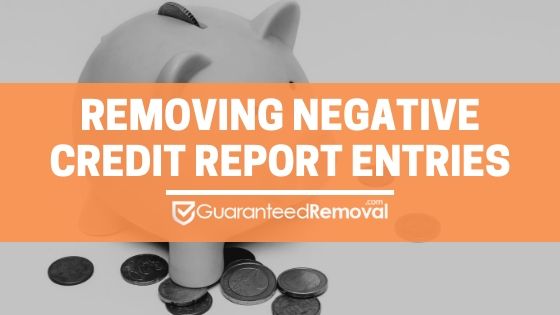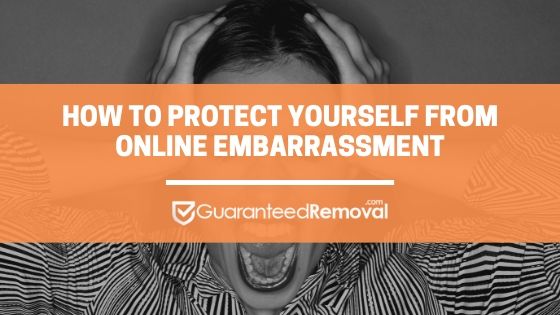How Can I Find My Mugshot? It’s Easier than You Think
If you’ve ever asked yourself, “How can I find my mugshot online?”, you’ve come to the right place. Learn how to find mugshots online with our step-by-step guide.
If you’ve ever been arrested, you may be shocked to learn that detailed information about your personal life has ended up on private websites — specifically, your arrest records, criminal records, and mugshots. The last thing anyone wants is for their criminal history to pop up during a quick internet search of their name. Luckily, there are ways to remove these damaging images from the internet.
Read on to learn why this started, and how to turn your prominent mugshots into a problem of the past.
Public Misconception
Some argue that posting mugshots online is in the interest of public safety. The immediate misconception when seeing mugshots online is the assumption of guilt — but it’s important to remember that an arrest doesn’t indicate that a crime was ever committed. A person arrested could have had their charges dropped, or may have never been convicted of a crime. Yet the arrested person could still have their reputation damaged by misleading information on the internet, from celebrity mugshots to inaccurate criminal records.
Ultimately, the removal of these images can help protect law-abiding citizens. In today’s world, many job recruiters, potential landlords, or even romantic partners often seek information online. Even just one mugshot stemming from a years-old arrest can spread like wildfire across websites and social media, falsely damaging someone’s real-life prospects.

Is My Mugshot Online?
It can be daunting for the average citizen to figure out how to find mugshots online to begin with. If you’re worried that any previous arrest records are accessible online, try the following:
- A quick search of your name in Google or another search engine (you can also check the “Images” section of search engines).
- Check well-known sites like FindMugshots.com and PrisonHandbook.com.
- Use the inmate search tool on your state’s department of corrections website.
- Check your state’s sex offender registry.
- Check the websites of your local police departments and sheriff’s office.
- Download the app JailBase and search for your arrest record.
How Did They Get My Mugshot?
Most often, bots pull these public images from a federal or state corrections website, such as a corrections inmate locator tool. Even some police or law enforcement agency release mugshots online when posting about crimes, though some states have recently begun to outlaw this. Essentially, any of the tools recommended in the list above could be used to pull your mugshot or arrest record without your consent. These databases are often updated every 24 hours, and as soon as an image appears, it can spread.
In most states, it’s up to law enforcement agencies to decide whether to release mugshots — which they often do. Occasionally they may withhold mugshots during ongoing investigations, and there are some states with stronger laws governing who can access criminal records. For instance, California recently passed a law forbidding law enforcement agencies from posting mugshots of someone accused of nonviolent crime on social media.
Juvenile records are usually withheld from the public, but in rare cases, juvenile mugshots are released if they commit a serious crime that leads them to be charged as adults. And there are strict laws regarding the dissemination of information related to sex offenders. Depending on the severity of the crime, it might be required for a perpetrator’s mugshot to be stored in an online database.
Mugshots As “News”
These mugshot sites aggregate millions of images under the guise of “news,” but can damage personal reputations in the process. There are several reasons that they classify themselves as news:
- Most search engines give news articles a higher ranking regardless of the veracity of the information, meaning your mugshot could be pushed higher up on the search results.
- This allows many websites to continue their practice of publishing mugshots online. By declaring themselves as news organizations, they become more immune to legal action.
Again, while many of these sites argue they’re providing a newsworthy public service, they’re ultimately just damaging reputations without repercussions.
The Legality of Public Mugshots
As mentioned, in many states mugshot records and other arrest records are legally part of the public record. Unfortunately, in most cases, this means they can be posted online without a private citizen’s permission. This is partly due to the Freedom of Information Act (FOIA), which, starting in 1967, made everything from marriage certificates to death certificates part of the public domain. In 1996, an amendment to the act made it even easier to access this type of information electronically.
Now, the criminal justice system is fractured across state and federal lines, making it difficult to have standardized laws regarding how websites upload and remove damaging personal information. Ultimately, this leaves individuals on their own when it comes to facing mugshot extortion.

Where to Start
Ready to learn how to find my mugshot in the digital environment? Let’s get started.
Once you’ve determined that your booking photos or other vital records have been made public, it can be overwhelming to figure out how to begin erasing your criminal record. There are numerous options:
- Working with a third-party company such as online reputational management (ORM) firm to facilitate the removal of mugshot online
- Reaching out to the website(s) directly
- Posting more information of your own to try to lower the chance of the mugshot being seen online (this can be time-consuming if you are busy to be writing articles, press releases, blogs, etc.)
- Attempting to get your conviction expunged
What’s Best for Me?
Of these options, many recommend working directly with an online reputation management (ORM) company to begin the removal process. Although an individual can reach out directly to a search engine or a website to remove information, they will likely have little success if the information is publicly available. You can also work with law enforcement agencies to expunge your record if there is a minor offense to clear — but this is an arduous process that usually requires filing a petition in court. And posting more of your own information (on social media or websites) can lower the chances of your mugshot or other sensitive information being discovered, but won’t actually delete the content from the Internet.
ORMs generally have experienced staff and bespoke technology that allow them to quickly find mugshots and criminal records faster than a simple internet search could. If previous methods fail, paying an ORM ensures that past mistakes or misunderstandings are permanently erased, not just buried in the search results.
Working with an ORM
Working with an established company to remove one’s mugshot online gives you the benefit of legal expertise, a proven track record, and guaranteed results. ORMs such as Guaranteed Removals also only charge clients once content is fully removed, and ensure that, once removed, any harmful online content is gone for life. From criminal records to mugshots, an ORM will ensure that your arrest record will no longer have an impact on your public life.
It can be daunting to begin a mugshot search on one’s own, since there are so many potential websites to sift through. An ORM will handle every possible mugshot online as well as future postings that could affect your reputation.

How Else Can an ORM Help Me?
An online reputation management company can do much more than erase arrest records and mugshot records. They can also enhance the online reputation of businesses and individuals, and remove likewise damaging content, including personal information that could risk your privacy.
An ORM can also focus on producing positive content, including writing articles in your area of expertise to establish you and your firm as a thought leader in your industry niche. Your website, including the About Us and bio section, will be optimized for search and page ranking. Your LinkedIn bio will also be updated. Regular blog articles optimized for search will be created so that fresh, new, and positive content is continually generated. Google loves great, relevant content.
ORMs go beyond simply posting on your behalf. They can use high-level strategies to change the Google algorithm and rank your business higher up in search engine results. This can give your company a leg up against the competition when it comes to web traffic.
The Bottom Line
If you’re looking to permanently delete any public records — from juvenile records to death certificates to marriage certificates to mug shots — from the Internet, working with an ORM can singlehandedly address all of your needs. It may seem daunting to try and even begin the mugshot search, let alone deletion, but clearing one’s evidence of criminal history online can positively impact your future, whether it’s in the job market or your personal life. There are proven resources to help, and state laws are slowly developing to address the overall issue as well.
If you’ve been wondering how to get your personal information off the web once and for all, GuaranteedRemoval can help. Contact our team today by dialing 941-304-5206 to learn more or to receive a free removal analysis.
What to Do If Someone Has Your Phone Number and Why It Matters
A scammer can use your phone number to harass you and your close ones and steal valuable data and sensitive information while impersonating you.
The huge progress of technology and the vastness of the Internet has brought many things, both good and bad. And somewhere in between people found a way to use someone else’s phone number and get away with it unnoticed.
And with all the breaches that have happened lately, there’s a possibility that you may fall a victim to phone spoofing scam.
Can someone steal my phone number?
Most definitely, yes! Your mobile phone number is present throughout the Internet, and it’s prone to being an easy target for scammers to try and hijack it and gain access to all your data, social media accounts logins, apps logins, and text messages, etc.
There are plenty of ways your mobile phone number and your privacy may be compromised and used for malicious intent:
Data mining
The simplest form for scammers to use your mobile phone number is by putting it through people search sites – where in a swift method the scammers can acquire enough information about you. All those search sites sell your personal information to hackers and scammers.
What’s scary is that there’s plenty of data they can find about you just from putting your mobile phone number through a people search site.
Your address, criminal records, and close relatives’ names among other things are at their disposal to be used by the scammers to blackmail you, hack your social media accounts, and even commit identity theft.
Phone spoofing
To put it simply, phone spoofing is when a scammer makes your phone number appear on a recipient’s caller id when you didn’t even make the call. Essentially, phone spoofing is used to hide the real identity.
And there are plenty of reasons why it’s done so frequently:
- Access to valuable pieces of information: A standard method used by private investigators and collection agencies to lower the risk of being detected while gathering sensitive data through spoofing.
- Business purposes: Plenty of businesses spoof real local phone numbers to mask their identity to protect buyers’ and sellers’ phone numbers, and to prevent transactions from happening outside their platform. Each of them gets a number that can be temporarily used for calls, and once the period expires the spoofed numbers are reassigned to other parties.
- Commit fraud: This goes without saying. Phone spoofing is used to persuade and scam potential victims to make big purchases or to provide plenty of valuable information that may be used to access bank accounts which results in the victim losing his money.
SIM swapping
A sim swap scam is a danger that lurks frequently and the things that can be done with sim swapping can cause some serious trouble.
A scammer usually searches for a weak spot in two-factor authentication and two-step verification. Also, he will use social engineering techniques to exploit the service provider to port the victims’ mobile phone numbers to the fraudster’s SIM card.
Once the sim swapping has occurred, the scammer will now receive any text messages and voice calls that were intended for the victim.
And because he now has the number, he could easily bypass the two-factor authentication methods and gain access to any account that is tied with the number, from your contact list, your address, and area code up to your financial accounts, social media accounts, etc.
This will leave an open space for him to either transfer money from the victim’s bank account, extort him, or to sell his data on the black market on the deep web which can be used for identity theft.
Things go further down the line. You may not even be able to get your cell phone number back once the scammer managed to fully convince the telecom service provider.
How to protect yourself from phone spoofing?
Now that we’ve made it clear that your phone number can be spoofed, we’ve compiled practical ways to deal with this potentially serious issue:
Change your number, get a new SIM card
The first logical thing to do is to change your phone number.
Yeah, it may be a hassle to get a new SIM and retrieve all the contacts that you’ve accumulated throughout the years, but changing your phone number sometimes may be the only option
Contact your telecom provider and change your phone number as soon as possible.
Leave a voicemail message
To let your contacts know that you’re a victim of phone spoofing, leave a voicemail answering message that says your phone number has been spoofed and that they should not engage with the caller.
Make sure you also tell them to block the number so that it will lose the value for being utilized by being blocked numerous times.
File a report to the FCC
If you are sure that someone is using your cell phone number, filing a complaint to the Federal Communications Commission (FCC) may be the best option to sort this issue out.
Just go to their website and fill in all the information needed or call their hotline.
Protect your privacy
Discretion is advised. Do not put your phone number on your public profile or any online account.
Update your information on all accounts, and use different usernames and passwords on all online accounts for extra security.
Additionally, check your credit card bills, phone bills, and bank statements. If something seems odd, report immediately to the financial institutions and let their work professionals check for everything.
Bottom Line
The best way to not fall a victim to spoofing is early prevention.
And even then there’s still a chance that a scammer will find a way to use your phone number to commit a crime or to scam other cell phones.
If the worst happens, freeze everything! Freeze your cell phone number, and your bank accounts and contact all the service providers that can help you sort the problems out.
Additionally, keep track of all the call logs and messages you’ve done so that you can protect yourself from being held responsible for any potentially illegal activities committed by phone calls using your number.
Take all these things into consideration and apply every step for much-needed security.
Frequently Asked Questions
- Is caller ID phone spoofing legal?
According to the United States Truth Caller ID Act of 2009, phone spoofing is allowed but it’s considered illegal when a person ” knowingly transmitting misleading or inaccurate caller identification information with the intent to defraud, cause harm, or wrongfully obtain anything of value”. And if there’s plenty of evidence that states they have violated this act, their actions are considered illegal and they will face a penalty. - How do I know if callers are using spoofed Caller ID?
To quickly identify if the caller is using a spoofed Caller ID, dial the number that appears on your display. The cell phone number may be busy or give you an inactive message and you even may get a person to answer your calls to tell you that they didn’t make an attempt to call your cell phone number.
If you’ve been wondering what to do if someone has your phone number, GuaranteedRemoval can help. Contact our team today by dialing 833-873-0360 to learn more or to receive a free removal analysis.
How to Find Out If My Information is on the Dark Web: Your 2022 Guide
Wondering how to find out if my information is on the dark web? With our guide, we help you locate your details and remove them, protecting your online privacy.
There are vast possibilities for people that are into the dark side of internet usage – the Dark Web itself. For people that are trading and selling data, this is a place where they can do that freely.
Criminals use a plethora of hacking forums and websites where they are trying to learn the black trades of the internet and trade or buy credit card accounts, personal information, bank statements, social security numbers, and many more sensitive data.
When it comes to getting your own details, internet criminals are trying to collect your data from various phishing scams and data breaches. There are way too many options for them to trick you and press you to share your personal data, not knowing that you are a victim of a fraudulent activity
Every user on the internet should be careful and not share bank accounts, financial information, and credit card numbers and avoid saving passwords on Google Chrome. This stolen personal information has its own price on the web and these cybercriminals are trying to benefit from it.
To get a better grasp of what is the dark web, internet gurus separated the internet into three layers:
- Surface Web
This is the web that all people are using and everybody is already acknowledged of. This is where everything legally is happening and most websites are hosted. Social media platforms, news outlet websites, e-commerce, and all the variations of the websites we know are here and this is the safest place on the internet when in comparison to the other two layers. - Deep Web
The deep web hosts the sites that are invisible to the casual user and this is where most of the websites that require invitation or login are hosted. Many confidential data details like photos and videos that are in possession of certain websites are hidden on the deep web. This is considered the middle layer of the net and this is where bank statements, credit reports, and social security administration are hidden. - Dark Web
This is the area that falls under the deep web and it is only accessible with special browsers and authorization. All the content that is shared and hosted on the dark web is not indexed and cannot be found with the regular search engines. This is the place where illegal stuff is going on and where you can set up a private network, called a darknet.
But how does everything work? How these people are actually getting and selling our data? Stay with us and understand how the dark web works and how can all of us be exposed to such scams and identity theft cases.
How does the dark web work?
The dark web is the space of the internet that is not easily accessible. This is where most of the illegal stuff is happening and you will need to use a specific browser to surf this area of the internet. Once you enter the dark web, you will need to know how to navigate it and locate what you are after.
To protect its users, the dark web browsers are using many layers of encryption and are providing the customers with very high anonymity – suitable for trading or selling forbidden products and services.
To access the dark web, you will need to use the Tor browser which actually is one of the largest browsers for such use and most people are going with this one when they access this side of the internet.
Tor ( The Onion Router) redirects the data via multiple encrypted layers and it helps to lose track of the actual location. Most of the websites where you will be able to find your misused data end with the extension .onion
When it comes to using the Tor browser, everybody can use it and access the dark web, since it is free and you can download it on your computer. The thing is that the US government and the state department are behind this browser, making it legal to be used by everyone.
To summarize the usage of the dark web, we can freely say that there are only several legit businesses and companies that are using it and aside from that it is mostly used for any unusual activity – mostly criminal.
How do dark web scans work?
Scanning dark web sites is not a simple process. This is called dark web monitoring and when companies that are hosting certain darknet are releasing a data breach or dumping data that goes public, this is an opportunity to stroll through this data and check if you can find something useful.
The term data dump refers to releasing usernames and passwords to certain webs that require login on all three layers of the internet. Besides the credentials, there are also dumps from credit bureaus, online health records, medical records, driver’s licenses, and social security numbers that various identity thieves gathered all around.
Once these details are used, they are dumped and when no longer needed can be posted on the dark forums where are finally sold to any interested party. The dark web scan refers to checking these leaked details that are found on the dark web.
So if some tool or service provider is scanning the dark web on your request, in case they find your details, they will let you know that you’ve been found on any of those databases.
Do not be fooled that they will be able to scour the whole dark web. They are only checking the web lists that they are aware of and any public leaks they have access to. There is no possibility to scan the whole dark part of the internet.
What should I do if my info is on the dark web?
Before we continue with some steps that you can do in order to take action about your data found on the dark web, we want to suggest some guides to protect your data before the leak happens.
For starters, try to use some password manager service or tool that will protect your credentials from possible data breaches. If your data is secure, then you should not worry about unwanted exposure. Also, for additional protection, activate two-factor authentication on the login pages where this option is available.
The next point that you need to avoid is to connect to any public wi-fi networks. No matter if you are using Tor or any regular search engine like Google, you will have your details exposed. Since these networks are open, there is a possibility for a hacker to enter your device using the network – and if this happens, your data is available to them.
Unfortunately, besides contacting the dark webmasters and request removing your data from their websites, there is nothing much you can do if your details are already publicly available on the dark internet.
You will not be able to post fraud alerts or monitor the entire dark web. But do not fret, there are some additional steps you can take in order to prevent any potential misuse of your details. Here is what you can do:
- Place a credit freeze in order to avoid hackers opening credit in your name and misusing your bank account.
- Obtain free credit reports and check if there are any fraudulent charges. The credit report will show your status regularly since if you are a victim of identity theft, this might help you restore your credit standings. This is a free service that you can use if you find your data exposed.
- When it comes to suspicious activity on your social security number, you can create a mySocial Security account and claim your number with your name to avoid anyone else creating an account in your name. Also, you can report this to any Social Security office physically.
- In terms of protecting your account passwords, try to generate new passwords and have a habit of changing passwords regularly. Have secure email accounts that you are going to use as backup emails to recover passwords.
- If you locate your driver’s license details on the dark web, the one thing that you can do is to report that to the Department of Motor Vehicles with the details that your license is compromised.
- A passport number can also are traded online. Report this to the closest police station, no matter the country you are residing in.
To be truthful, sensitive information is traded online daily, and many other online accounts suffer from identity data theft. The entire dark web is full of such details and this is the place where online privacy is damaged the most.
The world wide web and the normal web browsers are in focus for attack since they have the most users with minimal experience, being careless with using their credit card number and sharing sensitive info. If you do this, you are exposing yourself to being attacked and having your data traded or sold.
Need more help with getting your information off the web? Click here to contact us now!
Why Are Mugshots Public Record?
Are All Mugshots Public Record? The Surprising Truth
Are all mugshots public record? Allow us to explain…
The easy truth of the situation is that our government reveals excellent transparency in regard to the criminal background of people. In years past you would have to visit a local county courthouse in order to acquire legal documents such as a mugshot, arrest records, or criminal history report. However, nowadays, it has become all too easy. Even the law enforcement agencies and law enforcement agency websites have direct access to criminal investigation records, arrest records, and mugshots online.
Virtually anybody with $10 and an online connection can find your house address, telephone numbers, email address, and plenty of other private pieces of info including criminal charges, arrest records. But in regards to mugshots, as a result of the notorious sites such as BustedMugshots or even Mugshots.com. It’s become too easy to find another individual’s mugshot online.
Let us dive into the background behind how this happened and where your personal information and criminal charges may be hiding out on the dark web.
What’s known as Public Record?
All court records, from authorities cases to estate actions, are generally public documents. Such records are enrolled with or maintained by a governmental office, sheriff’s office, police department, or law enforcement agencies, and available for evaluation by any taxpayers in the neighborhood. These include things like sex offenders and the sex offender registry, public deed listings, and other publicly available information.
Your booking photo and arrest record are also considered public records. Law enforcement make mugshots public records so they can use those mugshots public records in other cases. Law enforcement can use them for future photo lineups and other uses in their investigation work.
By way of instance, if you are interested in buying a new residence, you can collect the last owner’s name. You can achieve that by researching the county’s property reports in your district accounts or county clerk’s office, the majority of the time these may be found online thinking about these records are public documents.
However, particular documents or information might be redacted from the public eye. Since it adheres to the confidentiality or privacy exemption clauses inside a specific state or federal law.
FOIA (Freedom of Information Act) provides these databases with all the freedom to lawfully collect public documents from inside a national agency.
Regardless of whether the public document has been created by the agency or directly gathered by them. To be able to acquire this information, you have to send them a signed application or request. However, most counties throughout the United States do not require any such form to be mailed. You can simply walk into the district office and request it.
Under the FOIA, it is possible to ask about any public documents conceived or obtained by that particular agency. You might likewise be asked to pay a fee, however, that is rare and very uncommon.
Exclusions By FOIA
Your liberty to accumulate reports under FOIA isn’t without bounds. Documents might be excluded from public documents under specific conditions. For instance, it might result in an undesirable intrusion of another person’s privacy or is related to a topic of national safety.
Also, if the charges or case has been sealed or expunged you will NOT be able to access these reports.
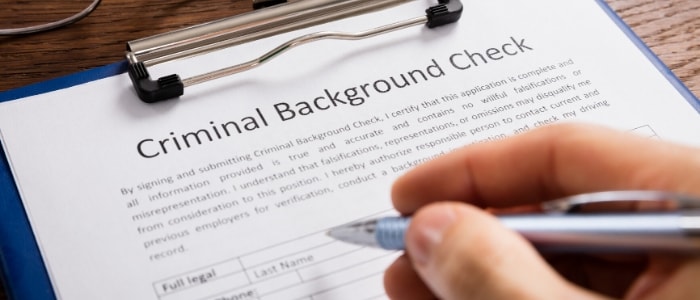
How to Obtain Public Records
Ordinarily, a public document is a report filed with any specific town, county, state, or national government office. In layman’s terms, public records are just reports that anybody may receive. Although public records are normally records. These documents may consist of anything from maps to documents, to movies, photos, tapes, applications, letters, novels, along with criminal records listing the person arrested, and so forth.
Court records are a popular example of public records. As an illustration, in the event that you found your next-door neighbor, let’s call him Max, he was detained for a violent national charge a couple of decades back. It is possible to inquire to get a copy of those public records to find out more about the incident. Sometimes, these findings can only be seen or gathered online. Florida and Maryland allow the public to search for arrest reports even from mobile phones.
Moreover, you can scour the web for bankruptcy issues by using the database called PACER. Mugshots can help others when they’re looking to find a specific individual. However, mugshots can frighten the local community if an individual was discharged while considered dangerous. This reason alone is why we saw the emergence of mugshot publication websites back in earlier 2015.
Our judicial system anticipates transparency from the national constitution. Any effort to maintain mugshots independently would end in suits by people affected. But this didn’t alter the mugshot industry in the slightest.
Our Process
Since these are mugshots and public records, the backlash onto an individual’s career or social life can be devastating. The court clearly says websites that place mugshots online, in its own analysis. Mugshots.com being one of the primary mugshot publication sites was contained on that list. This website charges a minimum of $300 to remove a mugshot from its database.
Some countries have enacted laws to restrict the number of published mugshots prior to the case being settled. One of those states is New Jersey. The whole notion of public documents would be to skip the authorities and start collecting money from individuals.
In the past, the notion of “public record” was created to protect the people. Now it is used entirely against them when applying for a job, buying a new home or even dating online. Since it surely does when you’ve got a secretive government. But, in addition, it may still cause harm in the electronic age we’re experiencing now.
The internet extends both ways, individuals wish to have the ability to find whatever they desire online. However, if the data makes them look bad there’s an uproar, complete catch-22.
As citizens of the United States, we have the liberty to spot issues through freedom of expression. Although nowadays individuals are beginning to use public records and mugshots for monetary gain.
Removing Mugshots From Public Records
Mugshot posts normally start to surface online about two weeks after the arrest. Addressing this mugshot online immediately provides you with leverage when working to eliminate criminal records from public documents.

Through advanced background checks, it’s likely your criminal background will disclose itself. Sites like WhitePages or Spokeo show everything from the title, criminal background, relatives, home addresses, etc. Our mugshot removal staff may notify all search results instantly after the removal of your public documents.
Reach out to the website owner to remove your information However, with the thousands of emails, these mugshot publication websites receive day after day your message will most likely get buried in their inbox.
Let GuaranteedRemoval do the heavy lifting for you. With over 10+ years of experience, we provide a 100% removal guaranteed. What do you have to lose? Receive your FREE MUGSHOTS REMOVAL ANALYSIS.
How GuaranteedRemoval Works
If you’d like to find out more about ways to operate to get rid of public documents such as mugshots on the internet, please fill out the form below and we’ll contact you when we could.
How Are Employers Viewing Background Checks?
Employers are viewing your background. You may be wondering whether your prospective employers are looking into your background. The simple answer to that is: “yes, they are”. They do this for a variety of different reasons. You may need government security clearance or have significant financial responsibilities. In addition, you may be working with vulnerable people and employers want to know if they can trust you.
Either way, more and more, background checks are becoming a standard procedure during the hiring process and it is vital that you are aware of this. A recent survey by Endora reveals the extent to which background checks are conducted – and why, sometimes, they aren’t.
While more than 98% of businesses conduct pre-hire background checks on potential new employees, less than one-quarter of businesses proactively screen current employees – exposing CEOs and Boards to significant safety, security and compliance risks.

Is it Legal for Employers to View My Background?
Thus, if you are curious whether there are employers viewing your background, there is nothing wrong with prospective employers conducting a full background check. You will usually have to give permission, which means you will be aware of these checks. Furthermore, the federal Fair Credit Reporting Act (FCRA) is there to protect your rights as well.
The federal Fair Credit Reporting Act (FCRA) promotes the accuracy, fairness, and privacy of the information of consumer reporting agencies. There are many types of consumer reporting agencies, including credit bureaus and specialty agencies, i.e., about check writing histories, medical records, and rental history records.
Employers viewing your background take into consideration the FCRA regulations, which also stipulates how old the information contained on these reports can be. This means that you should know yourself exactly what a prospective employer will find out about you. Should any of that information be less than positive, you may consider disclosing this before the search is complete.
That said, prospective employers also perform other types of background checks. One of these is to ask you for past references. These will usually be employment references, unless you are fresh out of school or college, in which case they can be academic or even personal references. These references are designed to get to know you as a person and worker.
What About Internal Privacy Policies?
Keep in mind that, even if an employer asks for the background information listed above, and it is legal, the former employer does not have to answer. Many companies limit what they will disclose about former employees. Sometimes this is for fear of lawsuits for defamation. Other organizations may not release information due to internal privacy policies.
The other thing that many employers will do is screen your social media profiles. This, they believe, will give them an even greater insight into who you are in your personal life.
Employers Viewing Your Background, What’s Next?
Be aware of the fact that employers will look you up before they hire you. Clean up your social media profiles, get copies of your credit report, arrest records, and “Google” your name for more information, etc. Therefore, to make it difficult for employers to view your background online remove any negative items you find about you.
- Remove them yourself. Ask the website owner (s) to delete the damaging information about you.
- Contact a removal team who works with a legal team to remove your negative data
Either of the above two methods will eliminate any doubt about what others will find when searching your name in Google. In fact, you should ask for a copy of your personal Lexis/Nexis Accurint Person Report, which is a free report. This report prepares you for what a prospective employer will see about you. If you don’t like what you see, then contact a reputation management firm, like Guaranteed Removal, to help you improve it.
Employers are viewing your background, unfortunately, if you have questions about how to clear your background quickly and safely, contact our professionals.
How Are You Viewed Online? 2021 Solutions
Viewed Online | Most of us spend a lot of time online looking at other people’s social media accounts. Recent research has shown just how much of an impact this has on people. For instance, it stands to reason that those who post a lot of negative things online as negative people.
Yet, those who post a lot of positive things can come across negatively as well. Those who talk quite openly online about how happy they are with their relationship tend to be happier in themselves but liked less by others. What you share online is also very important. People who talk about themselves and their achievements can often come across as bragging.
One thing that few people consider, however, are the responses they receive online and how that clouds other people’s judgment. Psychologically speaking, we find second-hand information about an individual more reliable because individuals will usually talk about themselves in a more positive, but perhaps not entirely honest, manner. You can not believe everything viewed Online

The Impact of Positive Posts on Facebook
A recent piece of research has been completed that looked at the impact of positive posts on Facebook in particular. Four positive status updates were created on four different profiles and they belonged to four categories, as shown below, and their responses were very interesting:
Personal self-authored, meaning that the profile owner wrote the post and talked about himself or herself in a positive light. Readers saw this individual as more competent and physically attractive. They also saw these individuals as very confident.
General self-authored, meaning that the profile owner wrote the post and talked about an activity or opinion, rather than his or her own achievements. Readers saw this as even more competitive as well as being more appealing as a friend.
Personal friend-authored, which means someone else wrote about the profile owner in a positive light. Readers saw these individuals as more appealing as a friend. They also saw the profile owner as more popular and modest, but not as confident.
General friend-authored, meaning someone else wrote the post and didn’t talk about the profile owner. Readers saw these individuals as modest.
What Does This Mean?
It essentially means that someone who shares a lot of information about themselves may be bragging. Someone who is talked about by others in a positive light is someone who is more likable and popular.
That said, this study looked specifically at the impact of social media. If you look yourself up online, plenty of other things may appear as well. Past and current work history listed, as well as criminal convictions. There has been a surge of the latter in recent history because criminal records are now being digitized and there are third-party organizations that have made these publicly available.
You may also have been featured in a newspaper or other sources of media, and those documents are publicly available. All of that has an impact on how people see you when they look you up online.
Finding a Balance
Everything seems to be about finding a balance. If you appear in many different professional publications, you may come across as an expert in a certain field, but this could be intimidating to those with lower standards of education. Similarly, if you have featured in an opinion piece, you could attract those who share your opinion and alienate those who don’t. A criminal record, viewed online unsurprisingly, is never a positive thing and will not portray you in a good light.
Social media (read more) is complex because it is very different to look at yourself through the eyes of someone else. It is important to consider, therefore, what you post and in what tone you post it. Perhaps there is something about sticking to cat videos when it comes to sharing information on social media, although it is likely that there are some people who would find you incredibly boring for doing so. Learn how to remove negative articles on the internet with the help of our experts.
How to Remove Images From Google
How to Remove Images From Google
When was the last time you Googled yourself? What do you think you’ll find? Odds are, not much. Especially if you tend to keep an “under the radar” type of lifestyle.
Whether you like it or not, your personal data and images can be found online within a few simple clicks on Google. You may not surf the web or be as tech-savvy as your 10-year old nephew, however, people are looking you up.
In 2018 alone there were more than 2.9 million cases of identity theft. That’s is only what was documented. Hackers and cyber-criminals that exist on the dark web have the capability to ruin your reputation.
That is why it is imperative to know what information is online about you and what you can do to improve your reputation. Build your safety net online with GuaranteedRemoval.com.
Types of Images Google WILL Remove
We get a lot of phone calls on a daily basis asking why Google won’t remove a photo that they deem negative or “unwanted”.
In order to give our clients a better understanding of how Google search results works are by thinking of Google like a librarian. Think of it this way – you tell Google your question and they point you in the direction of the best possible answer, the search results.

The same goes for a librarian, you ask them for a book and they point you in the right direction. The problem here is that the librarian does not own the books, nor does Google own these websites.
Due to internet privacy and censorship statutes, Google cannot pick and choose what shows within the SERPs and in what order.
For this reason, the only way Google will remove images from their search results is if it breaks their guidelines.
Here is a shortlist of possible images that could be removed due to a breach in Google’s policy:
- Trademark & Copyright Infringement
- Slander/Defamatory Posts (*must have proof)
- Elicit Photos of Minors
- Mugshots of minors, law enforcement, and other high ranking public officials
Types of Images Google WILL NOT Remove
From the previous section, you can get an idea of what we are about to say…
Google will NOT remove any images just because you don’t like seeing them online. There must be legal documents, proof to discredit the post, or a license claiming you own the content they published.
For most, this is impossible. Most websites have fine print within their disclaimers stating when you post on the platform, they own the content.
For example, let’s say you just bought a new bathing suit and wanted to post a photo on your Instagram to show your friends. You do so, but 5 minutes later your neighbor’s son Tommy finds it, screenshots it and shares it on his profile! Technically, once you post anything on Instagram you do not own it anymore. Other accounts can share it as they wish with no repercussions. You cannot legally demand Tommy to remove it. The only route you have is to befriend him or his Father and kindly ask.
Be careful about what you post online, because you really never know who is going to see it, or what they are going to go with it.

What to Do When Search Engines Won’t Remove an Image
If you come across an image or even a webpage you deem negative towards yourself you have a few options.
Third-party websites that post your information (most of the time) are doing so legally.
For this reason, you should directly contact the webmaster or editor of that webpage to request removal options. Most of the time you only get one shot at this.
First impressions, just like your online reputation can make an everlasting impression. You need to proceed with caution and an open-mind when contacting the site owner.
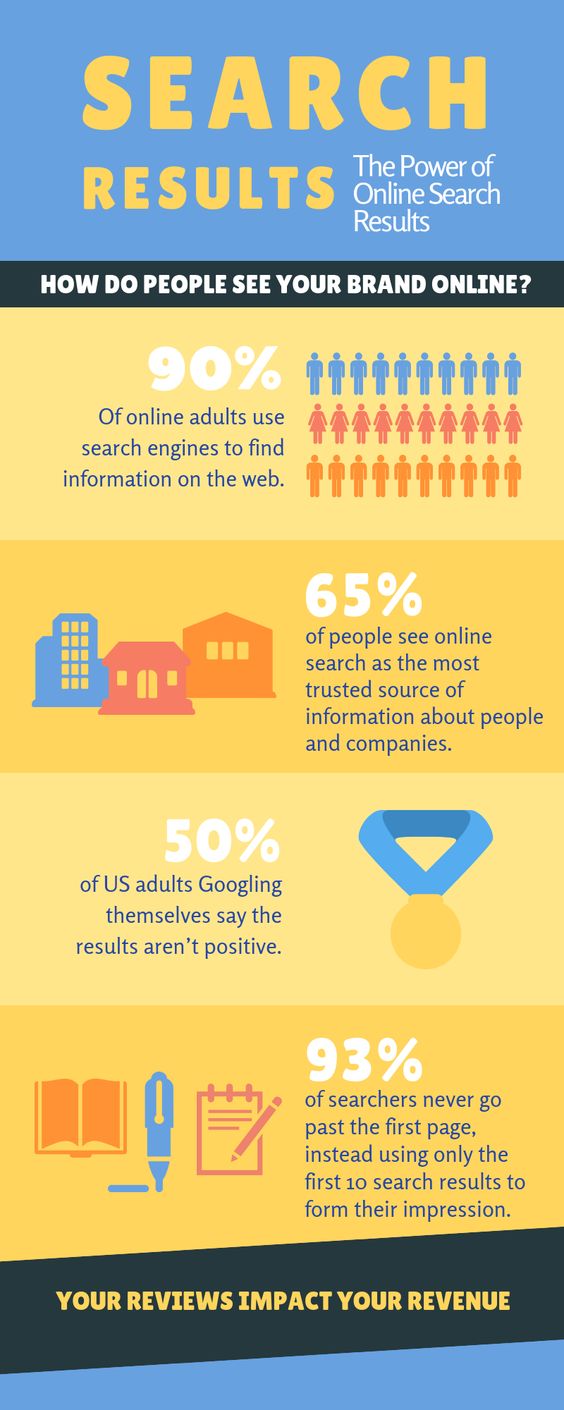
Utilize Google Chrome extensions such as Hunter.io to locate viable email addresses. Once you obtain these contacts send something along these lines in a message, “We think the image you posted on your website is impeding on my reputation and character, because….. and here are the supporting documents….”
Make sure to again use supporting documents and any resources you have at your disposal as you work to remove an image from Google search.
The chances of having your photos removed from Google and even the direct source is slim to none. If you are unable to discredit the post or influence them to change their mind that image may show up in Google indefinitely.
What to Do When the Image is Not Removed From the Site
So what do you do when you cannot locate contact information and Google is not helping with getting your image removed from Google search? Where do you turn to when you have exhausted all of your options.
This is when it gets tricky if you are not tech-savvy.
When it comes to suppressing unfavorable images and unwanted content online that you cannot remove, the only viable option is publishing new content. Do this in high volume and daily for at least the few several weeks.

Sites such as Vimeo, Crunchbase, and Slideshare are great candidates for uploading new content that will stick. Unlike others who tell you to simply post to Facebook, you need to diversify your efforts.
Burying Personal Information on Google Search Results
If you cannot remove images from Google will the assistance of the site owner of Google directly, what can you do?
This method is simple in theory however takes an immense amount of work to bring your desired results to life. Thanks to Facebook, Instagram, and various other social media platforms sharing new content online has never been easier.
Not seeing any photos of yourself? Make a Pinterest and add 5 new photos each week for a month and see what happens. The odds are some of those images may begin to rank of Google, Bing, and Yahoo.

Working to remove an outdated content page, on the other hand, is quite simple. Let’s say within the search results for your name there is some negative connotation however when you click on the link the webpage is dead. In other words, it would prompt an ERROR 404 code.
This can be fixed with a quick visit over to Google Search Console’s Link Removal Tool. Here you simply copy and paste the dead URL and submit for Google’s approval. Within a few days, Google will work to recrawl and remove it from their search results.
What Type of New Images Should You Post to Outrank the Negative?
When it comes to publishing new content online the main key is to post different photos. Do not post 15 selfies and expect Google to flood the search results with camera shots 5 inches from your face.
Instead, gather photos from overtime in different scenarios that showcase various actions or things being done. For example, post vacation photos, photos with friends, photos of just yourself, sports events, concerts, and much more.

The point here to make sure Google does not view each individual photos similar in any way other than your face being consistent across them all.
As we previously stated, make sure you diversify your online portfolio when it comes to social media. Do not post all your photos at one time onto Facebook and store them in a singular album…
Instead, post one photo to Facebook, one on Pinterest, one of Twitter, maybe even one of SlideShare. But you get the point, do not put all of your eggs in one basket. Don’t forget to include your name in your handle, bio, any description, and alt tags when you can. These are easy signals for Google to read and confirm this page is surely about you.
High-quality & Engaging Images
Look about your search patterns on social media. Do you tend to quickly scroll past distort/pixelated photos OR you find yourself immersed in these thrilling HD photos where you can see every detail? Yeah, we thought you’d choose the latter, smart choice.
Nobody wants to take the time to view a poor quality post. As someone people refer to these types of posts as “cringe”. With the ability to quickly tank your follow count and make suppressing anything online even that much harder.

Use Alt Tags, Title and Add Your Name Wherever You Can
We briefly touched upon this topic a few sections prior. When it comes to Google, there are many factors they consider before ranking a specific photo anywhere.
A few quick tell-tale signs that an image is about a specific person is by adding that individual’s name into various fields. But also being cautious not to keyword stuff, this is penalized by Google. That essentially means you copy and paste your name over and over again, where in the past that would work.
Nowadays, Google is much smarter than we give credit. Using broad search and semantics, Google’s algorithms to able to identify and point users in the right direction even if they misspell something, use a synonym, or are slightly off-topic.
GuaranteedRemoval: 100% Guaranteed Image Reputation Solutions
By now you should understand how anything negative or unflattering about your came to appear online in the first. However, you also have come to learn there are a plethora of methods you can implement in order to slow down any negative impacts it may have on your life long-term.
By utilizing social media and publishing consistent, high-quality content you have the capability to suppress and flood out any negative search results (photos or webpages) with perseverance and persistence.

If you have tried to accomplish this feat on your own but have seen little to no success. Please complete the contact form below and one of our knowledgable reputation analysts will contact you within 24-hours to discuss any questions or concerns you may have.
Remember the internet as a double-edged sword… Do you know what Google says about you?
Restore Your Reputation
How To Restore Your Reputation Online (2019)
Together with the broad popularity of the world wide web, there’s an increasing tendency to rely on top search engines for special information regarding services and products. Sites that get recorded on the first pages of the search engines get the most amount of consumer attention.
Internet reputation management is all about appropriate planning and implementing significant online procedures which will help build a positive identity for your company, goods, and solutions among internet users. In the event, your site’s reputation was tarnished in some way or it is essential to revive it if you would like to keep your foothold in the competitive world of business.
Many top companies within the industry of search engine optimization supply cost-effective services for online reputation management. Many of those search engine optimization companies maintain an expert staff and use innovative tools for monitoring the negative information on customer sites. The key protective activities undertaken by them comprise of the following:
- Powerful content writing
- Eliminating any unwanted content or hyperlinks
- Submission of favorable posts
- Generation of sites and user engagement
- Brand security
- Generation of successful backlinks
On certain occasions, the firms even go for lawful processes for the protection of their customers. It’s essential to pick the ideal firm for dedicated and quality services that will help restore your reputation.
The chief elements contributing to the success of almost any business organization is the belief and confidence clients have in your services and products. So maintaining a superb online reputation is crucial. To attain this, you can count on trusted search engine advertising and positioning providers, that follow ethical methods to restore your reputation various administrative actions. We’re a well-established online reputation firm providing quality solutions for individuals and companies of all sizes.
5 Steps to Restore Your Reputation
Be Proactive When Your Repair Your Reputation
If you don’t do it, somebody else will (and you likely won’t enjoy it). Disgruntled clients or ex-employees can certainly render negative feedback of the experience with your business on popular review sites. Sites such as Yelp, or on social networking websites like Twitter and Facebook. And as a result of its viral nature of the world wide web, that one poor review may spread like wildfire. Furthermore, leaving you with a significant public relations nightmare on your hands.
Remain Transparent With Customers
This attribute helps you better compete with bigger chains and businesses. Disgruntled clients are more inclined to keep on doing business with you when they feel just like you are making the attempt to understand their needs. This is accomplished by reaching out and responding to their opinions online forums, blogs, and social networking websites.

Avoid Timewasting Tasks
Stop wasting unnecessary time on minute tasks. There’s not any denying that the world wide web is a valuable tool for anyone. Regrettably, in addition, it makes it simple for corrupt individuals to distribute unwanted to negative content across the entire internet. However, business owners possess a strong influence in order to fight any emerging brand crises.
Ammend Disgruntled Feedback Quickly
Bad press online does not have to imply your online reputation is permanently tarnished. However, it does mean you need to take action, and quickly. As a result of the ability of search engines, you are able to track, address, and work to amend complaints regarding your goods or services. Before they have an opportunity to escalate.
Moreso, a few calming words and guarantee of activity from you can go a long way towards un-ruffling a couple of feathers and restoring your reputation. Take the time each week to review your online customer feedback and respond where necessary. Learn more about how to respond to negative reviews here. Plan out a response plan before jumping in headfirst.
Do you know your Reputation Score? Find out today
Protect Your Bottom Line
So, safeguard your bottom line, period.
Furthermore, when prospective clients and business partners Google your name, what they view in the search outcome could very well decide whether they decide to work with you. Bad reviews or poor results can put you out of a job. It can also cause significant harm to a bottom line in the form of lost revenue, leads, as well as business opportunities.
Conclusion
So, thank you for taking the time to read our blog on how to restore your reputation online. Remember, it is imperative that you remain proactive throughout all of your online reputation management efforts. This is a long-term battle that you will win with the assistance of GuaranteedRemoval’s expert team of reputation specialists.
Lastly, f you are someone you know is struggling to restore their reputation online, know there are options. Complete the form below and one of our specialists will reach out to you within 24 hours with a detailed plan of attack as well as a price and timeframe the project is expected to be completed by.
Removing Negative Credit Report Entries
Removing negative credit report entries can be tough. Let us walk you through how you can start to clean up your credit today.
At whatever point you do anything inconvenient surprisingly history, for example, default on an advance or Visa or have late installments, a negative section will be accounted for on your record as a consumer. At the point when a customer expels negative sections from his credit report, it is called credit fix.
These negative sections can influence you from numerous points of view. It will be more diligently to get endorsement for money-related items, for example, home advances and Mastercards, and you will definitely be surveyed a higher yearly rate (APR) and numerous extra add on expenses, for example, month to month and yearly charges and charges.
On the off chance that you end up in this circumstance, there is uplifting news. There are plenty of organizations, both conventional and on the web, which offer credit fix administrations, for an expense. On the off chance that you would want to spare yourself the monetary cost, you can endeavor this undertaking yourself.
Request a Free Consultation
What You Need
You should initially get a duplicate of your financial record, which might be finished by reaching the three noteworthy announcing organizations – Equifax, Experian, and TransUnion – and mentioning a duplicate. These three detailing authorities are will undoubtedly give one free duplicate of your credit report at regular intervals. You can call (877) 322-8228 to get your free duplicate. Then again, you can demand a duplicate from the numerous online organizations which offer this administration.
When you get your record as a consumer, you should take a couple of minutes to audit the data contained on it for any mistaken or false data. This survey ought to incorporate ALL data recorded, not simply the money related data. Make certain that your full lawful name appears and that your date of birth, past addresses, and your business data is precise.
Who to Contact
The credit authority has 30 days to check the credit report passage. On the off chance that the credit department can’t get confirmation inside 30 days, it must expel the section. The credit department will reach back to you with any moves it has made as to your entrances.
If there is a possibility that the credit revealing organization chooses not to change or expel a thing you feel should be modified or evacuated, you should contact the detailing office and solicitation that they let you know how and why they touched base at this choice. This is called mentioning a “strategy for the check.”

Despite the fact that this procedure can be tedious, it is advantageous so as to expel every single negative section. This will build your FICO assessment which will expand your odds of fitting the bill for better monetary items.
Removing Negative Credit Report Entries With GuaranteedRemoval
Please complete the form below to get started. One of our knowledgable reputation specialists will reach out to you as soon as possible with a detailed solution perfectly catered to your needs.
Request a Free Consultation
How to Protect Yourself From Online Embarrassment
How to Protect Yourself From Online Embarrassment in 2019
Have you ever heard the old saying, “once something is online it is there forever”? Well, in a sense this can be true in today’s world.
With the emergence of social networks and how easily individuals can gain access to the internet, there is always a chance that your personal information can fall into the wrong hands.
Knowing how to act is important however knowing how to prevent online embarrassment will not only save you stress but money in the long run.
In this article, we will discuss how you can use online reputation management services and popular practices to minimize the risk of online embarrassment. In addition, we will cover how to properly use social media to reduce the spread of your personal information online.
Having a plan of recourse is never a bad idea. Learn how to create crisis management strategies with the best team in online reputation.
Now let’s dive into how online reputation is assisting individuals with monitoring, maintaining, and even restoring a positive web presence.
Using Online Reputation to Protect Yourself From Online Embarrassment
What is online reputation management? For those of you who are new to reputation management, online reputation management or ORM is the art of restoring, maintaining, and monitoring the online presence or notoriety of either an individual or a business.
When you share personal information online it is important to remember how large the internet is and how many people use it on a daily basis. Even if you are a normal person with a minimal presence online that does not mean you should stop worrying about cyber threats.
There are millions of cyber threats each year such as identity theft that cripple individuals not only financially but these threats could be an everlasting effect on relationships you have both on and offline.
It is better to start from scratch than to restore a negative reputation.
As you work to build and establish a name for yourself online it is important that you focus your efforts heavily on social media, press releases self-promotions, and SEO (if you have a personal website about yourself).
The most powerful of the three would be the distribution of press releases. Head over to Google and search for local news outlets in your area. Reach out to them and see if they offer a paid service where you write the press release and they publish it on their website for a fee.
Therefore, press releases are a sure-fire way to have new content to reach the first front pages of Google, Bing, and Yahoo.
Next, share those press releases via your social media accounts to gain more exposure.
Lastly, you can copy and paste your new release onto a custom website. Optimize it in hopes of obtaining another spot on Google’s SERPs.

Being Smart on Social Media
When it comes to sharing content online. It may be your first instinct to share funny, controversial, and borderline inappropriate content with your friends and family members.
Unfortunately, these actions can have everlasting effects on your online reputation as you grow older. If you have little to no information online about your search engines such as Google will scour the internet to find anything they can.
This could be a college photo of your drinking 10 years ago. Or an inappropriate Tweet that you thought was funny at the time.
Start by customizing your account settings and making your social networking accounts are private. This will limit the chances of anything reaching Google. Which may be good or bad depending on your situation. However, you will not have to worry about embarrassing photos appearing in the Images tab for the world to see.
Make sure the connections you make on each social platform such as Facebook, Twitter, and LinkedIn are people you trust seeing the information you post.
In other words, if you constantly post photos of you and your friends partying or on vacation. It may be a good idea not to befriend any of your work colleagues.
One easy tip to monitor yourself online is by tracking your name on Google Alerts. This tool allows you to receive instant email notifications the second something about you is published online.
Lastly, this could be a comment on one of your social platforms. Or an entire story about you posted by a third party without your consent. Google Alerts allows you to take action quickly if something negative happens online.
Control the Flow of Your Personal Information Online
So to elaborate more on how you can better control the flow of your personal information online it is important to know where you appear in the first place.
Our team here at GuaranteedRemoval.com will search over 400 websites. In search of any trace of information about you on the web.
If you would like to conduct this search yourself. We recommend searching through the first 10 pages of Google, Bing, AND Yahoo when starting out.
One of the easiest ways to control the spread of your information to set your privacy settings on social media platforms. In addition to limiting what the online world can see about you. You can also remove your information from over 45 background reporting agencies.
Otherwise known as People Search websites. These data aggregate websites house lots of personal information including your contact information, social media links, criminal history, and much more.
Furthermore, our team offers a simple removal solution to clear your name on your behalf. So, if you are interested in learning more about how Guaranteed Removal can assist you. Please fill out the form below and we will reach out to within 24-hours with a detailed solution.
How to Find Someone Online
How to Find Someone Online in 2019
Have you ever met someone at a party or networking event but forgot to grab their contact information or business card? If so, you have probably spent countless hours out of your day tracking down individuals with minimal success.
In 2019, the internet is home to millions of websites that we can use at our disposal to research personal information and public records referencing essentially anyone we want. Whether you are looking for that gentleman you had a conversation with at the bar or professional athletes. Odds are, you can find out how to contact them on the internet with a few simple tips.
In this article, we will walk you through some simple steps you can employ today if you are attempting to locate or find someone online.
Reunite yourself if your high school friends, locate long lost family members or find information on social media.
Most of the databases online come with a small fee however you are able to uncover anyone’s phone number, home address and lots of other personal information about them.
If you are struggling to locate someone online or wish to remove content from the first several pages of Google, Bing, and Yahoo please fill out the form below.
Request a Free Consultation
Top 4 Search Tools for Finding Someone Online
When turning to the internet to locate information pertaining to a particular subject or locating an individual, it is imperative that you utilize these methods below. These tools will not only save you lots of time but they are extremely accurate. Skip all the mistakes we made during our learning process with these easy tips.
Social Media
In this digital age, if you are not on Facebook or Instagram you are most likely living under a rock or you are a 55-year-old dad who still uses a Motorola Razor flip phone.
Locating individuals on websites such as Facebook has become so simple that it is often shocking at how easy it is to find people online. For example, let’s say you met another person during a night out with your friends, all you have is their first name along with knowing where they’re from, or where they grew up. Social media websites such as Facebook allow users to directly search names and then cross-reference those results when mixed with other criteria such as location or education (if you know where they went to school).
Now keep in mind that many millennials are restricting their social media privacy settings so others cannot locate them as easily however we have other tried and true methods when it comes to finding someone online. Even if you cannot find them on social media.

Background Check Websites
We will cover background check websites in greater detail in one of the following sections however it is important to touch upon the importance of these databases.
With about $10 and a stable internet connection, anyone is able to uncover personal and private information about anyone who was born in the United States.
There are over 45 background check websites online. Often known as people search and data aggregate websites on the internet.
* To learn more about how you can remove your own information from these background check websites, please fill out the form below. We will reach out to you as soon as possible.
Request a Free Consultation
Search Results (Google, Bing, and Yahoo)
90% of online users say they visit Google in search for answers to all of their questions. This is why it is crucial that you ensure your search results are not only positive but rid of personal information.
But what is the best way to locate someone instantly when scouring Google, Bing, and Yahoo for their information?
The best way to narrow down a search engine results page is by placing the main keywords (their name) without quotation marks. This helps Google narrow down the results and only show you websites where that individual’s first, middle, and last names are present. Typically reducing the pages available for search from several hundred to a dozen pages or less.
For example, if you are looking for an individual names John Smith that you met at a networking event in Tampa, Florida this is how you could locate John’s information:
Head over to Google and within the search field or search box you would type in the following:
- “John Smith Tampa”
- “John Smith” Tampa
- “John Smith Tampa Florida”
These will narrow down all of the prompted results to show only individuals names John Smith associated with Tampa, Florida.
Without adding in the quotation marks you will be left filling through hundreds of useless pages before you find any information at all (if you even get that far).

Mugshot Publication Websites
Now there are is a plethora of reason why someone would need to find another individual online. Whether it be for employment, datings or simply making a new business connection. People are some sort of information that desires to find.
Mugshot websites are one of the leading searches online in 2018-2019. After the emergence of several mugshot publication websites dating back to 2015 employers no longer have to wait for background checks to finalize before they can determine whether an individual is or isn’t a fit for their company.
Our removal team has the ability to remove mugshots and criminal records from over 500+ websites so if you are seeing your criminal history or someone you know please contact us as soon as possible to see what options are available to you.
Utilizing People Search Websites
As we touched upon briefly before, people search websites are a “gold mine” when it comes to finding someone online.
A simple web search on websites such as TruthFinder, MyLife, WhitePages, InstantCheckmate and many more disclose information such as the following for anyone to see:
- Name & Birthday
- Email Addresses
- Phone Numbers
- Physical Home Address
- Relatives (family members and friends)
- Social Media Links
- Criminal History
- …and much more.
Our 2-week removal solution will ensure all of your personal and private information is deleted from the internet once and for all. Backed with our a 100% guarantee, you will essentially be “off the grid” and nobody will have access to your personal information listed above.
Final Thoughts on How to Find Someone Online
When it comes to finding someone online you may soon realize that your personal information is more available than you may have expected.
With the growth of people search websites, we are beginning to see a rise in cybersecurity threats such as identity theft as well as fraud.
Be proactive and act now before your information is stolen on the dark web. Most individuals have no idea that their personal information is being viewed or tampered with until it is too late.
To learn more please complete the form below and we will reach out to you right away with a solution specifically catered to you.



